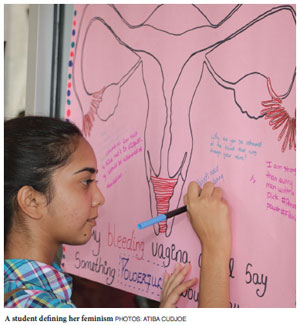 |
 |
 |
|
January 2017 |
The students were undertaking the final assignment for the first year course, Introduction to Women’s Studies, offered by the Institute for Gender and Development Studies, St Augustine Campus. The assignment required them to raise awareness about contemporary women’s issues and global women’s rights struggles amongst their campus peers. These ‘popular actions’ aim to teach students to connect scholarly analyses to public engagement in order to advance gender equality. It also encourages them to see dialogue and debate amongst their generation as a core part of their learning and university experience. Students chose their own topics, ranging from sexual harassment to sexism in media to child marriage. Clear messaging was key as were their use of creative and interactive methodologies, for making learning fun and building allies.. Most of the groups created pamphlets that explained the concepts they were mobilising, whether these were patriarchy, androcentrism, gender-based violence or child rights, and they included places for their campus peers to leave transformative ideas and recommendations. ‘Vagina cupcakes’ might seem frivolous, but they can spark discussion about the shame, silencing and hiding associated with women’s bodies, and with menstruation in particular, about which students were concerned. They also allow students to connect with art by hijabi women, resistance to Instagram’s initial banning of Rupi Kaur’s photo-essays on menstruation, as well as the Periods for Pence campaign when women sent then-Governor Pence thousands of messages about their periods after he signed a law imposing new limitations on abortion earlier this year. Medical students could benefit from better training in ending taboos around menstruation and so could future HR managers, psychologists and sociologists, for those taboos are part of a larger culture that reproduces women’s subordination and violence against women, as well as silences regarding matters of women’s bodies and sexuality. A campus now dominated by women students is the first place to practice changing norms about what is considered ‘private’ versus ‘public’, especially when those distinctions have traditionally cast women’s issues as private, although they are collectively experienced, and despite their implications for public funds and public spaces.
Their idea was inspired by campaigns like Binti Period which promote menstrual dignity through access to sanitary protection and education, as well as through enabling women to produce sanitary towels as a sustainable social enterprise, in India and Nairobi. Their key message was that “menstrual taboos reflect patriarchal ideologies which devalue and stigmatize femininity.” They started conversations with dozens of students, asking them “Have you ever thought of menstruation as powerful?” They created a ‘hopscotch’ game in which different squares contained empowering acts which highlighted that, before the addition of contemporary religious beliefs, menstruating women were thought to have special powers that if not used properly could harm others. In ancient Egypt, menstrual blood was used in medical treatment. Ancient Greeks spread menstrual blood with wine over fields to increase the fertility of the soil. Citing Cherise Charleswell, in her 2016 article published by working class think tank, The Hampton Institute, “How Patriarchy and Capitalism Penalize Periods,” the group, which also included Mika Ali, Jade Marchand and Jernece Vialva, created a petition calling for free pads and tampons to be accessible in the female bathrooms on campus – 330 students signed their petition. They met with UWI Guild president, Makesi Peters, who agreed that the Guild of Students would provide support. Dr Gabrielle Hosein is a Lecturer and Head of the Institute for Gender and Development Studies. She has been involved in Caribbean feminist movement building for two decades. She also writes a weekly column, Diary of a Mothering Worker, for the Trinidad Guardian |


 Towards the end of the last semester, a handful of first-year students sent cupcakes with frosting in the form of vaginas, some of them with swirls of red to represent menstruating vaginas, to the Campus Principal. This wasn’t just youthful generosity, it was part of learning that to raise awareness about an issue, first you have to draw people’s attention.
Towards the end of the last semester, a handful of first-year students sent cupcakes with frosting in the form of vaginas, some of them with swirls of red to represent menstruating vaginas, to the Campus Principal. This wasn’t just youthful generosity, it was part of learning that to raise awareness about an issue, first you have to draw people’s attention.  As two of the students, Kadija McClure and Raqiya Alexis, wrote, “We chose the issue because we were weary of having to hide and be ashamed of something that is natural to us. Menstruation is perceived as impure, disgusting, and dirty. We chose the issue to inform the public that, no, menstruation is not a taboo, it is not disgusting, but is powerful, as it was once seen.”
As two of the students, Kadija McClure and Raqiya Alexis, wrote, “We chose the issue because we were weary of having to hide and be ashamed of something that is natural to us. Menstruation is perceived as impure, disgusting, and dirty. We chose the issue to inform the public that, no, menstruation is not a taboo, it is not disgusting, but is powerful, as it was once seen.”